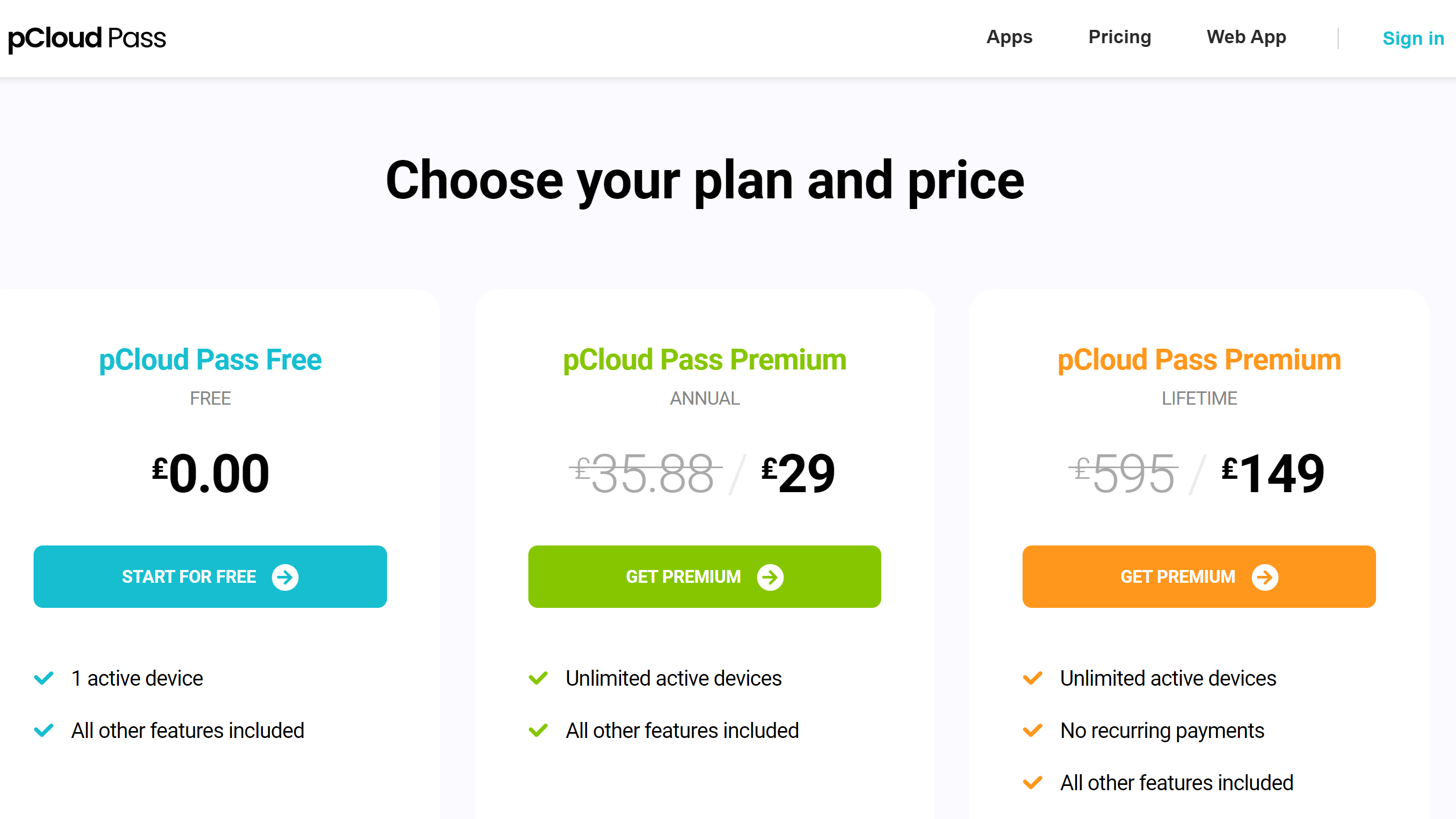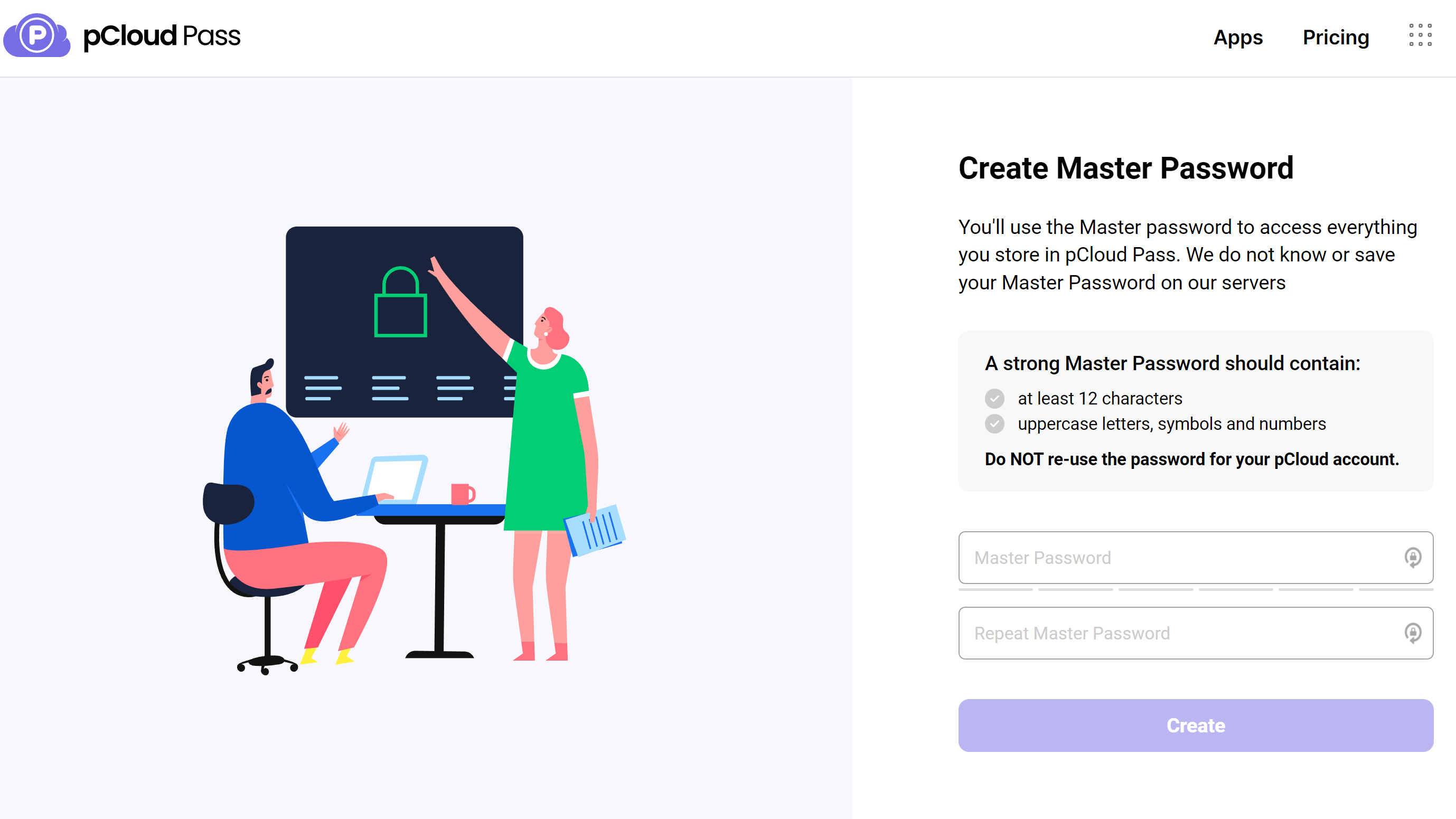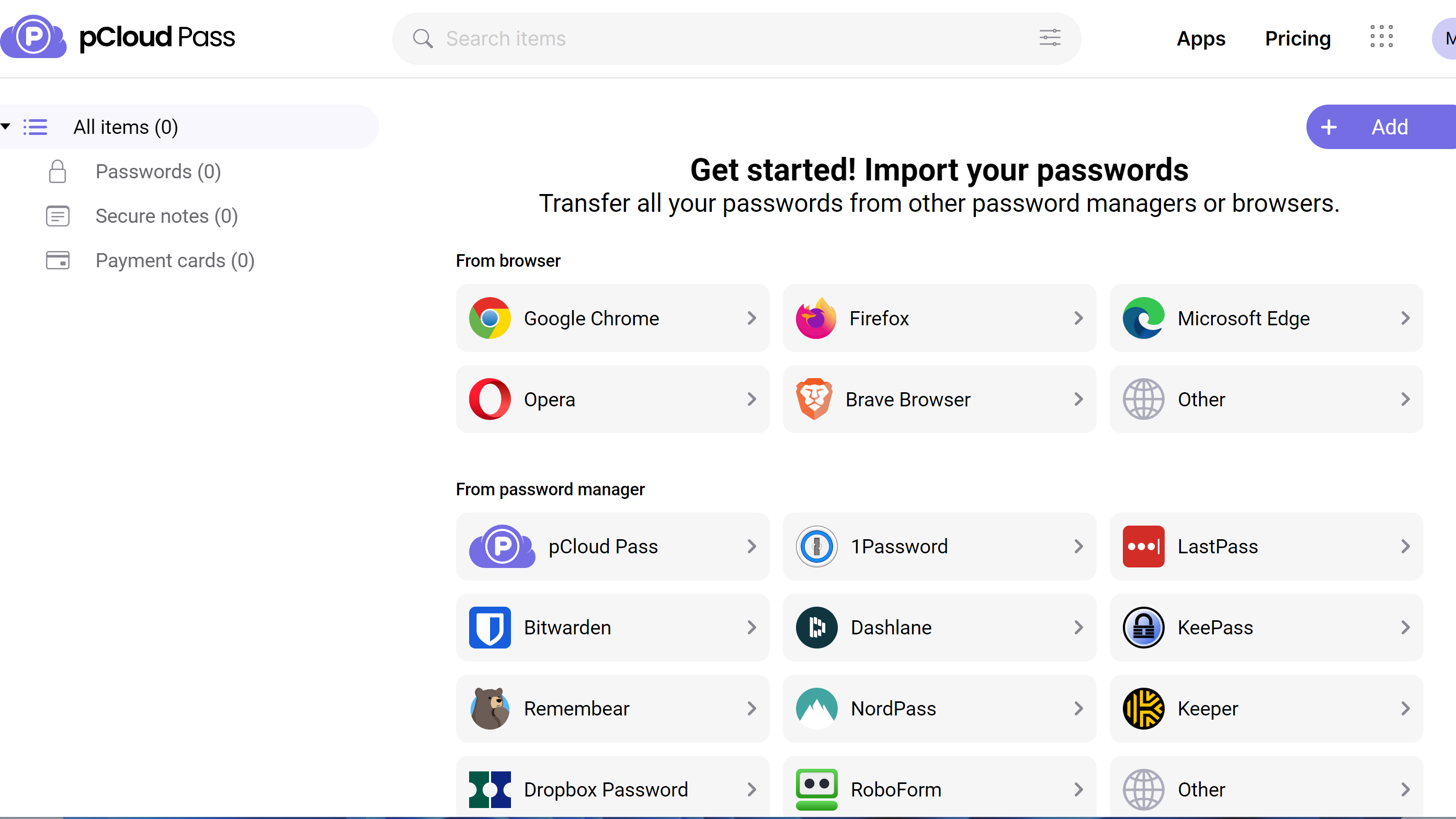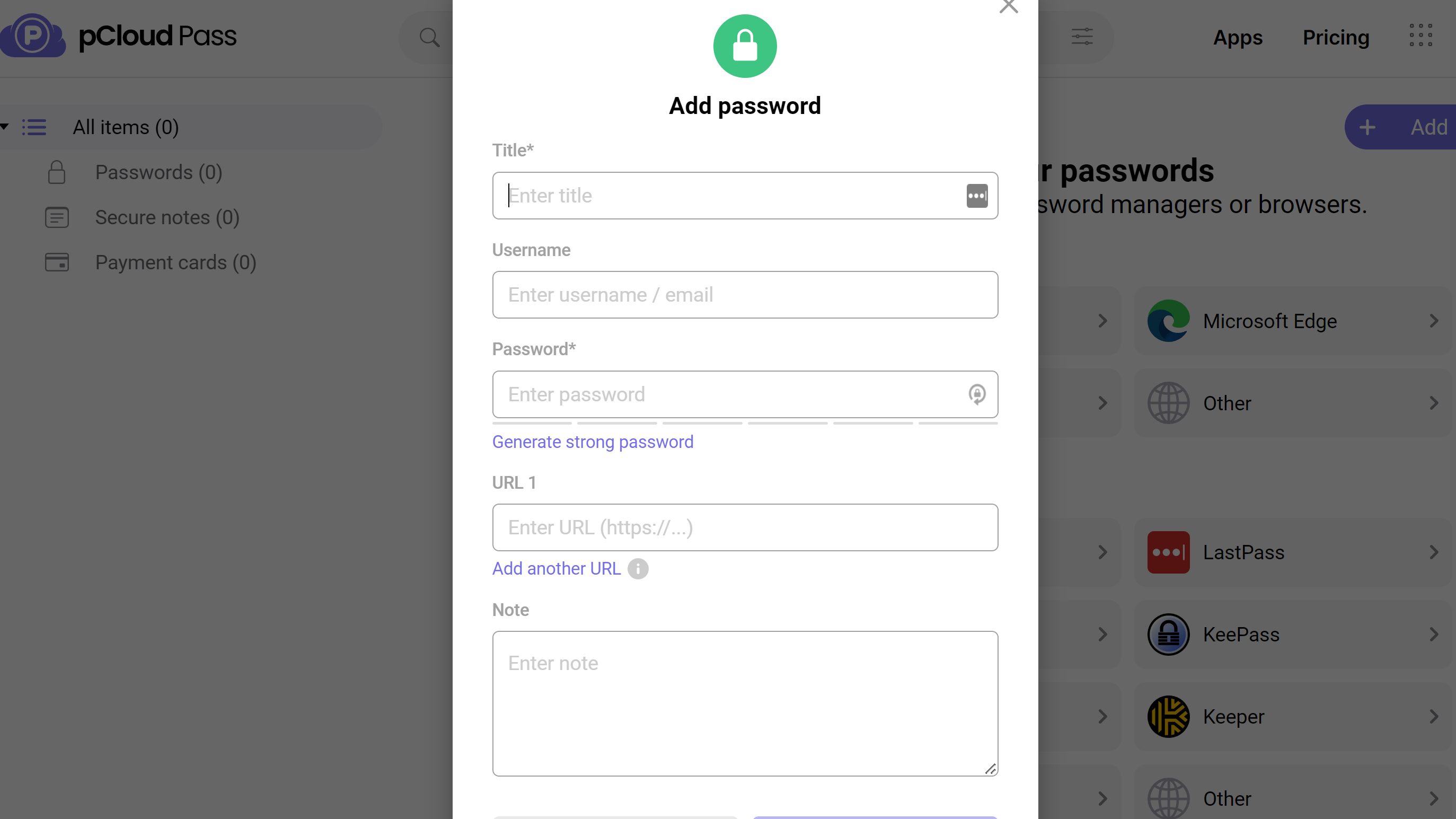TechRadar Verdict
A very impressive mainstream password manager with strong security and decent pricing, but could do with some more features.
Pros
- +
Impressive security credentials
- +
Good mainstream features
- +
Affordable
Cons
- -
Missing high-end abilities
Why you can trust TechRadar
The folks at pCloud are better-known for their cloud storage, but the Swiss firm has branched out into password managers with its pCloud Pass app.
It’s available as a free option for individuals with no feature restrictions, which is an impressive start, and it’s got fair pricing, solid functionality and robust security credentials.
That’s great on paper, but any new password manager has to perform well if it’s going to steal market share from established names like Lastpass and Dashlane – so we’re going to find out if pCloud can compete.
After you’ve discovered our in-depth conclusion, take a look at our choice of the best password managers for business.

pCloud Pass: Plans and pricing
The free option available with pCloud deploys the app’s full range of features for people who only want to use one device. That’s a different approach to many other apps, which allow free users to download across several devices but with a restricted array of features. But if you only want to manage passwords on your PC or laptop, it’s certainly a viable option.
The Premium plan costs $29 / £25 / AUD$50 for a year of access – a good price that puts pCloud Pass on the same sort of pricing tier as rivals like LastPass and 1Password. You still get every feature, of course, alongside usage on an unlimited number of devices.
A Lifetime plan is also available. That’s a rare payment option for a password manager, but it makes sense if you want a product you can use for years. At $149 / £140 / AUD$225 it’s a large initial outlay, but if you use pCloud Pass for more than five years then it’s better value than the annual package.
Sign up to the TechRadar Pro newsletter to get all the top news, opinion, features and guidance your business needs to succeed!
You can also pay monthly for pCloud Pass, but it’s poorer value – so it’s not an option we recommend.

pCloud Pass: Setup
It’s easy to get started with pCloud Pass. Register your account and choose either the European or US data region and you’ll be given a download of your recovery words – a cloud of 24 terms that can be used to restore your account in case you forget your master password.
Once that’s done, you can download the native Windows, macOS or Linux app, login using the web interface, install an Android or iOS app or deploy the Chrome, Firefox, Edge or Brave browser extensions. It’s excellent platform support.
The import options are superb, too. The app can transfer your passwords from five different browsers, more than ten different password managers or from CSV files directly.
If you want to add individual items to your pCloud vault you can choose a password, secure note or payment card, but you don’t get any other categories – one area where loads of other apps are more versatile. Happily, you can add notes and generate a secure password right in the creation window, but you can’t add custom fields – another common feature missing from pCloud.

pCloud Pass: Interface and performance
In most area pCloud Pass offers a solid range of password management features. It has a slick autofill function and can automatically save logins, passwords and card details. The app’s password generator includes special characters and can create codes of up to 34 characters in length – it’s one of the best examples around.
You’ll have to wait for some other features to be added, though – they’re listed in a “coming soon” section. The Safari extension is still under development, and you can’t tag passwords yet for easier organization. Trash folder access and restoration isn’t ready yet, either.
Nevertheless, pCloud gets the job done in most departments. It’s easy to use, too: the interface is straightforward, with your passwords and payment methods displayed in large icons in the middle of the screen, and users can filter their searches by title, username or URL. It’s easy to switch to other pCloud products from within pCloud Pass, and CSV exports and security options are all easily accessible.

pCloud Pass: Security
There’s lots to like about pCloud’s encryption algorithm. Individual files and folders are protected with industry-standard AES 256-bit encryption, while users’ private keys are safeguarded with 4096-bit RSA. Combine this with a zero-knowledge approach and strict Swiss privacy laws and you’ve got some of the best file encryption anywhere – indeed, pCloud is so confident that it can’t be broken that it’ll pay $100,000 to anyone who can hack the system.
On the users’ side, biometrics are supported through facial and fingerprint recognition, two-factor authentication is available, and the app can automatically lock itself if it’s inactive for a customized period of time.
pCloud Pass: Support
Support isn’t great. There’s an FAQ section but it doesn’t have the in-depth articles or guidance you’ll find in the knowledge bases provided by rivals. You can email pCloud with a form or directly with an email address, but there’s a warning that replies may be delayed by more than 24 hours.
Beyond that, there’s no phone, live chat or forum access. If you’re a tech-savvy individual then the lack of support might not be a big issue, but it means that pCloud Pass isn’t ideal for newcomers or people who need business-critical support options.
pCloud Pass: The competition
The lack of security and the absence of high-end features means that this app isn’t suitable for businesses. For individuals and families, though, it lines up against strong competition like LastPass and 1Password.
LastPass is a viable alternative thanks to its broader set of features, and 1Password has great family options and impressive organization. The only real area where pCloud Pass succeeds is its security, which is excellent.
pCloud Pass: Final verdict
Indeed, those impressive security credentials are pCloud’s best selling point, and they make this affordable app worth using if you want rock-solid protection. It’s got great platform support, too – unless you use Safari – and its features are fine for everyday password management.
If you want more features, improved organization for businesses or better support options, though, then look elsewhere.
Read our pCloud cloud storage review.
Mike has worked as a technology journalist for more than a decade and has written for most of the UK’s big technology titles alongside numerous global outlets. He loves PCs, laptops and any new hardware, and covers everything from the latest business trends to high-end gaming gear.
